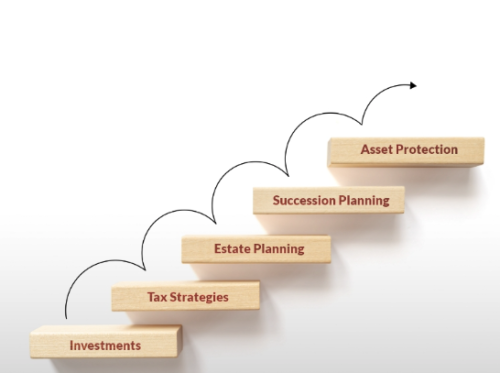Florida Wealth Management Strategies for High-Earners

As your wealth increases, so do the planning and investment complexities. Whether you’re a professional athlete with unique financial complexities, an executive dealing with corporate benefits, a physician juggling changes in the healthcare industry, or an individual who’s recently inherited an unexpected windfall, each scenario has its unique challenges.
These complexities can compound when dealing with the numbers (income, expense, taxes, savings rates), goals, and timelines. This is where the services of a highly experienced wealth manager in Florida can assist you in creating and implementing a sophisticated wealth management strategy.
This comprehensive guide will delve into the financial issues high-earners encounter in Florida. We will also suggest strategies that help you accumulate, preserve, and distribute wealth according to your wishes.
This Quick Guide includes the following chapters:
Chapter 1: Financial Planning for Business Owners
Chapter 2: Executing Financial Strategies for Corporate Executives
Chapter 3: Mastering Wealth Management for Medical Professionals
Chapter 4: Coping with Sudden Wealth: A Guide for Women
Chapter 5: Navigating Financial Challenges in Professional Sports
Chapter 6: What is the ILG Asset Protection Planning Process?
Read Our Popular eBook: “Be a Lion- Not a Sheep: How to Leverage Real-World Financial Plans”
Financial Planning for Business Owners
Owning a business is not for the faint of heart, particularly when you add non-controllables such as inflation, recessions, rising interest rates, supply chain issues, and rising salaries. It is tough to turn a profit and fund the accounts that will impact the quality of your retirement years.
Some of the more common pain points that our business clients experience include:
- Will you have to sacrifice the achievement of personal goals to maintain the business?
- Will unpredictable cash flows continue to fund business operations?
- Will your business remain solvent and profitable in future years?
- Do you have the correct insurance coverage and the right amounts?
- How will rising interest rates affect your cost of capital?
- How will rising healthcare costs impact your bottom line?
In-depth Insurance Evaluations and Proactive Risk Reduction Tactics: Thorough insurance evaluations are paramount when safeguarding your financial future. We understand that every business owner’s needs are unique, so we provide in-depth insurance assessments. You want a plan that is focused on pre-emptive risk reduction tactics to minimize the risk of potential losses.
Win-Win Deferred Compensation Structures: Building a solid financial foundation involves more than immediate income. You want a deferred compensation structure that benefits both the employer and employees. These strategic plans attract and retain top talent, offering tax advantages and long-term wealth accumulation benefits. Your plan should align with your business objectives while providing financial security for your team.
Elevate Your Business's Valuation: Your value is critical to your financial plan for a secure future. Our financial recommendations can significantly elevate your business's value. Whether you're planning for a future sale, seeking investment opportunities, or simply looking to strengthen your financial position, your wealth management team should have the expertise to help you make the right financial decisions for you and your business.
Streamlined Business Transition Blueprints: Transitioning your business, whether passing it down to the next generation or selling it, requires careful financial planning. You should have a business transition plan that lays out a cost-effective strategy for maximizing your proceeds after deducting all expenses and taxes. Your plan should consider your unique circumstances, tax implications, and long-term financial goals, delivering a personalized roadmap for a successful transition that safeguards your financial interests.
Executing Financial Strategies for Corporate Executives
 Corporate executives face unique financial challenges due to their high-pressure responsibilities and complex compensation structures. Executing an effective financial strategy for them requires a keen understanding of stock options, deferred compensation, and tax implications for their earnings.
Corporate executives face unique financial challenges due to their high-pressure responsibilities and complex compensation structures. Executing an effective financial strategy for them requires a keen understanding of stock options, deferred compensation, and tax implications for their earnings.
Since executives can’t leverage tax credits and deductions like a business owner could, developing other tax mitigation strategies is necessary.
Here are some tax planning strategies we assist our corporate executive clients with.
Deferred Compensation Plans: Many corporate executives participate in deferred compensation plans. These plans allow them to defer a portion of their income to a later date, which can delay the tax liability and position this income for lower tax brackets in the future.
- Many executives receive stock options as part of their compensation. Proper timing of these options can lead to significant tax savings. Considering factors such as vesting schedules, current market conditions, and individual tax situations can help maximize the net benefit of these options.
- Executives who own appreciated stocks can consider donating them directly to a charitable organization. This strategy can result in a charitable deduction for the stock's current market value while avoiding capital gains taxes on appreciation when the asset is sold.
- Regularly reviewing and rebalancing an executive’s investment portfolio to ensure it aligns with financial goals is essential. For executives, incorporating tax-efficient strategies such as tax-loss harvesting and prioritizing investments in tax-advantaged accounts can lead to significant tax savings over time.
- Setting up a family limited partnership or a limited liability company can protect assets and sometimes transfer wealth to younger generations. These strategies can provide centralized management of family assets and multiple opportunities for minimizing taxes.
Mastering Wealth Management for Medical Professionals
 With their high earning potential, most accomplished medical practitioners face unique financial challenges demanding help from specialized professionals.
With their high earning potential, most accomplished medical practitioners face unique financial challenges demanding help from specialized professionals.
From dealing with expensive student loans that financed their medical degree to navigating the complexities of malpractice insurance, asset protection, and tax implications of running a practice, there can be no shortage of critical hurdles for medical professionals.
Beyond these immediate concerns, physicians often juggle long-term financial planning, such as optimizing their investment portfolios, securing a comfortable retirement, and ensuring a seamless distribution of assets later in life.
With their unique earning potential and substantial professional risks, medical professionals often benefit from sophisticated financial strategies tailored specifically for them.
Here are five specific investment and tax strategies:
- One of the medical professionals' first lines of defense is maintaining adequate professional liability insurance (or malpractice insurance). This safeguards assets from potential lawsuits and provides peace of mind so professionals can focus on increasingly complex patient care.
- Maximizing contributions to tax-advantaged accounts like 401(k)s or IRAs can reduce current taxable income and facilitate the accumulation of more assets for retirement years. Setting up a Solo 401(k) or SEP-IRA for those with their own practices can produce even higher contribution limits.
- A Health Savings Account (HSA) is a triple tax-advantaged account with tax-deductible contributions; growth inside the account is tax-free, and withdrawals for qualified medical expenses are tax-free. This provides an excellent investment opportunity while accumulating more assets for future healthcare needs.
- Medical professionals may benefit from diversifying their investment portfolios beyond traditional stocks and bonds. Direct investments in real estate or through Real Estate Investment Trusts (REITs) or alternative assets like private equity or hedge funds can provide potential tax benefits, asset protection, and upside potential.
- Family Partnerships (FLPs) or Family LLCs serve as estate planning tools to consolidate family assets, manage and protect those assets from creditors, and potentially reduce estate taxes. They can be particularly beneficial for medical professionals concerned about asset protection.
Coping with Sudden Wealth: A Guide for Women Investors
 Managing sudden wealth can be both a blessing and a significant challenge. For many women, an unexpected influx of money can bring several financial pain points. It can start with the pressure to select the right team of professionals (financial planner, CPA, attorney) for advice and services.
Managing sudden wealth can be both a blessing and a significant challenge. For many women, an unexpected influx of money can bring several financial pain points. It can start with the pressure to select the right team of professionals (financial planner, CPA, attorney) for advice and services.
Many women have successfully navigated these challenging waters by selecting a financial planner connected to other professionals so they receive a holistic solution and avoid conflicting advice and duplicate fees.
By selecting the right professionals and equipping themselves with some basic knowledge, women can make the responsibility for sudden wealth a life-changing opportunity.
One immediate challenge is the payment of taxes. The next knock on your door can be the not-so-friendly tax collector from the IRS. It takes experienced tax planning advice from a wealth management firm in Florida that is experienced working with clients like you. Your goal is simple - pay what you owe, but keep that number as low as is legally possible.
With increased wealth, there is also a need for comprehensive estate planning. This ensures your assets are distributed to your heirs according to your wishes. Crafting or updating your will, setting up trusts, and considering the tax impact on your heirs are all important considerations.
Also, if you're thinking about sharing your newfound wealth with loved ones, it's important to understand the gift tax rules. You can gift up to $17,000 per recipient per year without triggering the federal gift tax. Anything above this amount might be subject to gift taxes or impact a portion of your lifetime exemption.
Growing your newfound wealth while minimizing taxes should also be an important consideration. Several tax-efficient investment strategies, such as maximizing contributions to tax-advantaged accounts and considering tax-efficient mutual funds or ETFs, can help minimize tax liability.
If you're charitably inclined, several financial strategies are designed to support causes you care about and produce substantial tax benefits. For example, establishing a charitable remainder trust can avoid capital gains taxes on appreciated assets, produce lifetime income streams for you, and generate future assets for the charitable beneficiary.
Navigating Financial Challenges in Professional Sports
The world of professional sports is as exhilarating as it is challenging. It offers fame, acclaim, and, often, substantial financial rewards. However, beneath the glamour lies a realm riddled with financial risks and pitfalls that athletes must navigate frequently. While hefty contracts make headlines, many athletes face the reality of fluctuating incomes based on performance, endorsements, competition, and the ever-present risk of career-ending injuries.
Because the lifespan of a professional athlete's career is much shorter than that of other professions, putting the right strategy in place as soon as possible should be imperative. More than most, the financial decisions professional athletes make today will impact the rest of their lives,
This necessitates a complex financial plan to ensure your assets produce the income you need for a comfortable lifestyle and financial security later in life. It may be difficult to think that far ahead, but we are here to help you make the right financial decisions for you and your family.
A diversified stream of income is one of the primary wealth strategies we recommend to clients who are professional athletes. This is based on the adage: Don’t put all your eggs in one basket.” You are more protected when your eggs are in several baskets.
Other than endorsement or licensing agreements, the following are some other ways we help professional athletes diversify their sources of income.
Bonds and Fixed Income: While they might not be as high profile as some other investments, bonds can provide steady, predictable income subject to less volatility than expected from the stock market.
This can be even more important during periods of excessive volatility. Investing a portion of your net worth in bonds may be prudent in various market conditions.
Real Estate Investments: Investing in quality properties can be another source of income and appreciation that may be more stable than the stock market. Consider purchasing rental income properties or investing in real estate funds that do the work for you. Real estate can provide potential capital appreciation, rental income, and some defense during uncertain economic conditions.
Venture Capital and Private Equity: Allocate a portion of your wealth to startups or newer companies, not just the blue chips. On the one hand, investing in smaller companies can be a source of higher risk. On the other hand, this strategy also has the potential to produce higher rates of return.
Invest in Your Knowledge: Think long-term by investing in your post-athletic career. Whether it's courses in business management, coaching certifications, or other fields of endeavor, this ensures you have another source of income when you leave the sports world at a relatively young age.
Remember, diversification is key to managing excessive amounts of risk. As a professional athlete, the spotlight might be on your athletic achievements. But, off the field, a well-diversified financial game plan can help you pursue long-term financial security.
What is the ILG Asset Protection Planning Process?
 You’ve worked hard to achieve personal and financial success. That’s why you need sophisticated wealth management services to protect it.
You’ve worked hard to achieve personal and financial success. That’s why you need sophisticated wealth management services to protect it.
The ILG Private Wealth team has developed the ILG Castle and Moat System™. Just like castles that were built to guard kingdoms from potential threats, our recommended method is tailored to safeguard and expand your wealth. It includes:
- Tax Avoidance Strategies: Think of this as the solid foundation of your castle. We don't just look for ways to minimize your tax burden today, but we lay the groundwork for ongoing, legally sound tax savings.
- Strategically Aligned Investment Strategies: This represents the sturdy walls of your castle. By aligning your investments with your unique objectives and risk tolerance, we ensure your wealth grows and is resilient during volatile markets.
- Estate and Legacy Planning: The towers and turrets of your castle. This ensures that your wealth passes seamlessly to the next generation, reflecting your legacy and benefitting those you care about the most.
- Risk Mitigation and Shifting Strategies: Your “moat” offers an added layer of defense. We identify potential financial risks and craft strategies to reduce, shift, or eliminate them, ensuring your assets and goals remain intact.
- Optimized Philanthropic Strategies: The bridges that connect your castle to the world. It's about making meaningful, tax-efficient contributions, whether to a purpose you're passionate about (church, university, hospital, medical research) or the community.
Our asset protection planning process is a comprehensive, integrated, personalized approach that benefits you and your family. It's about building a financial fortress that safeguards your wealth and ensures its availability for future generations.
To learn more about our services, connect with us.

